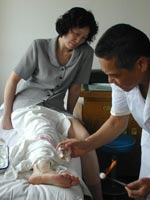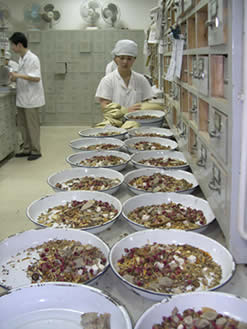 |

  Traditional Chinese Medicine (TCM)China possesses the oldest continuous cultural history in the world, one that extends back forty centuries. Medicine in China, a system of diagnosis and health care approaches, has a written history of more than twenty centuries. Traditional Chinese Medicine (TCM), as a comprehensive profession includes internal medicine, surgery, and dietary components evolved as early as the eleventh century BCE. These practices include acupuncture, moxibustion, massage, diet, herbal remedies, meditation, and both moving and static exercise. While the practices of TCM appear very distinct, they all share the same underlying assumptions regarding the human body and its place in the universe. The extensive documentation of traditional Chinese medicine sets it apart from all other folk medicine practices. The role of the environment and the holistic nature of care were central to TCM, and while Western tradition focused more on the disease entity and its particular cure, the principles of health care practice in Chinese traditional medicine do not need to wait until a disease appears, as the system works best in an environment where the practices become an aspect of daily living. The great TCM physicians kept their patients well rather than waiting for them to be stricken. There are cases in history where the physician refused to take payment when the patient was ill, considering the illness to be a failure on his part. To the credit of these early practitioners, their holistic approach focused on the health of individuals, their families, and the nation. Good physicians were treated as cultural heroes. Their emphasis on the classics, and continuing study allowed for the early development of a unified set of theories and practices. The early codification, however, did create some limitations in that they were steeped within the culture and therefore important cultural elements such as filial piety obstructed surgical and anatomical study, and the restrictions in treatment of women hindered the development of areas such as gynecology. Today, as in the past, TCM possesses two outstanding features; its holistic nature, and the codified applications of treatment according to differentiation of symptom-complexes. Illness is seen as a process of disharmony that needs to be alleviated rather than as a machinery breakdown that needs to be fixed. The holistic principles of TCM are based on Taoist thought. Taoism considers the natural laws of the universe and the interdependency between humans and the universe. Over a period of 2500 years, from observation and study, Taoist scholars described Five Fundamental Principles and their implications for health and wellbeing:
These principles lead to perhaps the most basic foundation of Traditional Chinese Medicine, the concept of yin and yang. The universe is composed of mutually dependent opposites, each giving meaning to the other. Yin represents cold, stillness, passiveness, darkness, within, and potential. Yang represents warmth, activity, light, outside, and expression. Illness is an imbalance of these mutually dependent opposites. The traditions speak of several basic substances that are important in the maintenance of health:
The familiar meridian system associated with acupuncture is the energy distribution system for the basic substances. These are often depicted as a system of channels that distribute the substances across the body. Since these channels do not fit any known anatomical structures, they are best thought of as processes rather than structures. The human body is seen as an organic whole, which is unified with nature. Changes in the environment, geography, seasons, and even alterations between day and night may directly or indirectly affect health. The establishment of treatment regimen is expected to be in accord with the different seasons and environments. It is important for the physician to come to understand the causative factors, the location, and nature of the problem in order to come to a conclusion regarding the confrontation between pathogenic and anti-pathogenic factors that are in play. There is much to be admired in the traditions of health care provision in TCM and Chinese culture. Chinese physicians are listeners, spending more time with their patients than is common in western practice. They are holistic in their approach to the patient and their family. TCM, while often slower in gaining immediate results, seems very effective in maintaining health and in chronic care, as the therapies appear to raise the whole immune system of the patient and are very cost effective. Travel to China with Explore! TCM Tours and learn more about Traditional Chinese Medicine first-hand. See how this dynamic system can work for you! ---Thanks to Dr. Raymond S. Edge for his contribution to this webpage. |
 
|